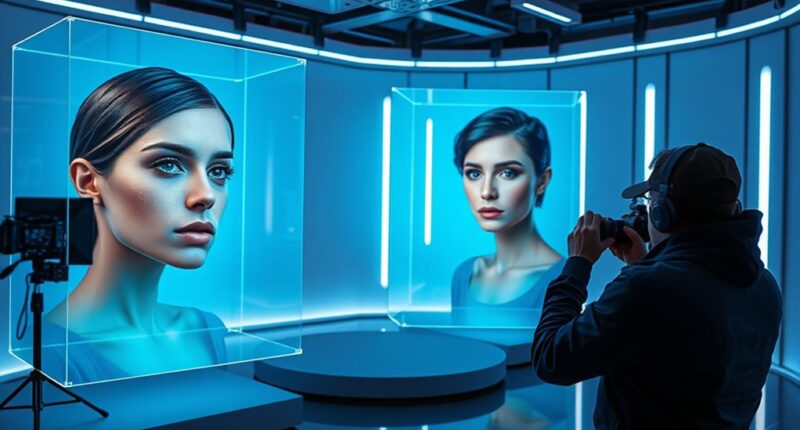As you explore celebrity AI avatars, it’s important to contemplate ethical questions about authenticity, consent, and potential misuse. These digital replicas can be powerful tools for entertainment and marketing but also raise concerns about misrepresentation, privacy violations, and misinformation. Without clear regulations, celebrities risk losing control over their image, and audiences might struggle to distinguish real from AI-generated content. Staying informed will help you understand how society navigates these complex issues as technology advances.
Key Takeaways
- Celebrities have rights over their digital likenesses, raising concerns about unauthorized AI avatar creation and use.
- Deepfake technology can spread misinformation and damage reputations if used maliciously or without consent.
- Transparency about AI-generated content is essential to maintain audience trust and prevent deception.
- Current legal frameworks often lack clear regulations addressing AI recreations of celebrities’ images and voices.
- Ethical practices require informed consent, respect for personal dignity, and safeguards against exploitation and misuse.
As artificial intelligence technology advances, the creation of celebrity AI avatars has become increasingly common, sparking important ethical questions. These digital replicas can be used in advertising, entertainment, and virtual events, but they also raise concerns about deepfake implications and celebrity consent. When you see a celebrity’s likeness manipulated into an advertisement or a virtual performance, you might wonder whether they truly authorized such use. The core issue revolves around whether celebrities have given explicit consent for their images to be used in these AI-generated forms, and if not, whether this infringes on their rights and personal dignity.
Deepfake implications become particularly troubling here. Deepfakes can convincingly superimpose a celebrity’s face onto videos or images, making it appear as if they said or did something they never actually did. While some use these tools for entertainment or artistic expression, others exploit them maliciously, spreading misinformation or damaging reputations. The line between harmless entertainment and harmful manipulation becomes blurred, especially when celebrities are unaware their likeness is being used in this way. Without proper regulation, AI avatars can generate realistic content that misleads the public and violates the celebrity’s control over their image.
Deepfakes can convincingly manipulate celebrity images, risking misinformation, reputation damage, and blurred lines between entertainment and exploitation.
The issue of celebrity consent is central to ethical debates around AI avatars. Many stars argue that their images are their personal property, and they should retain control over how they’re depicted, especially in digital spaces. Using AI to create a celebrity avatar without their clear permission can be seen as a violation of their rights, leading to legal and moral questions. Celebrities often have image rights agreements, but these may not explicitly cover AI recreations or deepfake applications. This gray area leaves room for exploitation and underscores the need for extensive policies that protect celebrities from unauthorized AI representations.
You should be aware that the proliferation of celebrity AI avatars impacts not just the stars themselves but also the audience’s trust. When you encounter AI-generated content featuring famous personalities, you might question its authenticity. This skepticism fuels the importance of transparency and informed consent, ensuring that audiences understand when they’re viewing AI-created or manipulated media. Additionally, the development of regulations based on Personality Test principles could help establish standards for ethical AI use in celebrity imagery. Overall, the ethical landscape around celebrity AI avatars is complex, balancing technological innovation with respect for individual rights. As this technology evolves, so must the legal frameworks and societal norms to prevent misuse and uphold the integrity of celebrity image rights.
Frequently Asked Questions
Can AI Avatars Replace Human Celebrities Entirely?
AI avatars can’t fully replace human celebrities because digital impersonation lacks genuine emotion and connection. While they can mimic appearances and performances, you’ll notice the absence of authentic experiences that define real celebrities. Creative ownership also becomes complicated, as AI-generated avatars blur lines of originality. Ultimately, AI can complement but not replace the unique charisma, spontaneity, and human touch that make celebrities truly special to their fans.
How Do AI Avatars Impact Celebrity Privacy Rights?
AI avatars are like shadows that stretch beyond your control, threatening your privacy rights. They can cause deepfake concerns and rights infringement, making it easier to manipulate your image or voice without consent. As these avatars grow more realistic, your personal details could be exploited or misused, eroding your privacy. You need stronger protections and regulations to prevent your likeness from becoming a tool for deception or harm.
Are AI Celebrity Avatars Ethically Created Without Consent?
You might wonder if AI celebrity avatars are ethically created without consent. The answer is no, it’s not right. Deepfake ethics highlight that creating these avatars without clear consent raises serious issues. Consent challenges make it difficult to ensure celebrities’ rights are protected, and using their likeness without permission can harm their reputation and privacy. Always prioritize obtaining explicit approval to respect ethical boundaries in AI development.
What Legal Protections Exist for Ai-Generated Celebrity Images?
Imagine a billboard suddenly popping up with an AI-generated celebrity image; you’d want protections. Legally, intellectual property laws cover original images, but AI-created content often falls into gray areas. Consumer protection laws also guard against deceptive practices, ensuring rights if you’re misled or harmed. While these protections exist, laws are still evolving to keep pace with AI tech, so stay vigilant about how your rights are protected.
Could AI Avatars Influence Public Perception of Real Celebrities?
AI avatars can definitely influence your perception of real celebrities by blurring lines around identity authenticity. Deepfake concerns grow as these avatars become more convincing, making it harder to distinguish between real and manipulated images. This can lead you to believe false narratives, damage reputations, or undermine trust in genuine celebrity appearances. Staying critical and aware of deepfake technology helps protect your perception and maintain clarity about what’s real.
Conclusion
As you navigate the shimmering mirror of celebrity AI avatars, remember they’re just echoes of fame, not the person behind the curtain. Every digital doppelgänger casts shadows of ethical questions, like ripples on a still pond. It’s up to you to decide whether to embrace this new frontier or question the cost of commodifying identity. In this digital dance, be mindful of the fine line between innovation and intrusion—lest the future become a Pandora’s box of unintended consequences.









